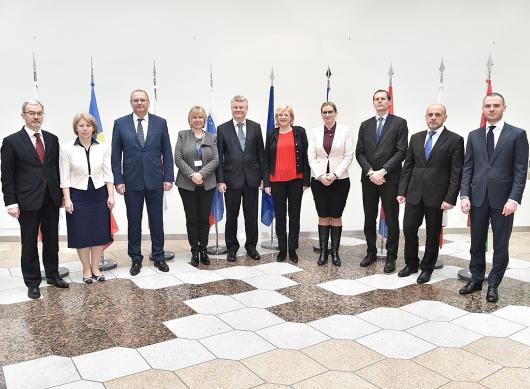
Joint Statement of the V4+4 Countries on the Cohesion Policy
27.01.2016 / 17:13 | Aktualizováno: 29.01.2016 / 12:34
The Ministers responsible for Cohesion Policy in the Visegrad Group, Bulgaria, Croatia, Romania and Slovenia met in Prague on 26th January 2016 upon the invitation by the Czech Republic holding the V4 Presidency.
The main goal of this meeting, which was organised by the Ministry for Regional Development of the Czech Republic, was to discuss and identify the most important aspects of the role of Cohesion Policy in the future EU policies, with a view to making a timely contribution to the discussion. Although we are only at the beginning of the implementation of the 2014-2020 programming period, it is time to start reflecting on what will follow, taking into account speedy changes in Europe or orientation to results of the EU policies. The informal meeting of V4+4 Ministers, presided by Minister Karla Šlechtová and attended besides V4+4 ministers in charge also by Commissioner for Regional Development Corina Creţu, President of the Committee of the Regions Markku Markkula or Vice Chair of REGI Committee of the European Parliament Stanislav Polčák, offered an open platform for free debating of highly sensitive political aspects of Cohesion Policy.
Conclusions of the debate were formulated in a Joint Statement. Its main points are:
- Cohesion Policy is a fundamental investment policy of the European Union supporting development, growth, creating jobs and competitiveness and investment in the less developed regions with positive impact on the economies of more developed regions, both direct and indirect. It contributes to the implementation of the Europe 2020 strategy, including the European Semester.
- Cohesion Policy has a unique potential to address long-term structural challenges taking into account the specificities and goals of the individual Member States and the EU priorities, which was proven during the economic crisis.
- Post 2014-2020 reform of Cohesion Policy, which is one of the most innovative, coherent and best-evaluated EU policies respecting the objectives of the performance-based budgeting approach, must remain a major priority of the EU budget also after the year 2020.
- Potential changes and further improvements of Cohesion Policy should follow lessons learnt and should be evidence based. In the future of Cohesion Policy it is necessary to discuss, among others, shared management and the principle of proportionality or further simplification of implementation of the ESI Funds as well as strengthen the legal certainty for beneficiaries and administrations.
JOINT STATEMENT OF THE VISEGRAD GROUP (CZECH REPUBLIC, HUNGARY, POLAND, SLOVAKIA), BULGARIA, CROATIA, ROMANIA AND SLOVENIA
Prague, 26th January 2016
We, the Ministers responsible for Cohesion Policy in the Visegrad Group, Bulgaria, Croatia, Romania and Slovenia (V4+4) met in Prague on 26th January 2016 upon the invitation by the Czech Republic holding the V4 Presidency between July 2015 to June 2016 to discuss and identify the most important areas of the debate on the role of Cohesion Policy with a view to making a timely contribution to the discussion on the future of this crucial policy.
We, the Ministers responsible for the Cohesion Policy in the Visegrad Group Member States, Bulgaria, Croatia, Romania and Slovenia:
1. STRESS that Cohesion Policy is the fundamental investment policy of the European Union supporting development, growth, creating jobs and competitiveness in all Member States and their regions which brings added value for the European Union as a whole, and contributes to the balanced functioning of the Single Market; REMIND that investments in the less developed regions positively influence also the economies of more developed regions in direct and indirect ways, including through flowback.
2. UNDERLINE that Cohesion Policy has the unique potential to address long-term structural challenges taking into account the specificities and goals of individual Member States and regions and the EU priorities as it was also proven during the economic crisis.
3. HIGHLIGHT that Cohesion Policy is the main EU policy that effectively contributes to the implementation of the Europe 2020 strategy also taking into account the European Semester as it was widely recognized during the negotiation processes.
4. ARE CONVINCED that after the 2014-2020 reform Cohesion Policy is one of the most innovative, coherent and best-evaluated EU policies respecting the objectives of the performance-based budgeting approach and that experience therewith should be reference for other policies including those managed at the EU level.
5. Therefore STRESS that Cohesion Policy must remain one of the major priorities of the EU budget also after 2020.
6. STRONGLY BELIEVE that new challenges in the EU should not be addressed at the expense of relevant important policy objectives by re-labelling the existing resources, but by introducing more flexible programming arrangements taking into account differentiated territorial impacts of such challenges while maintaining the overall long-term investment nature of the policy.
7. EMPHASIZE that centrally managed instruments are important, however concentrating mainly on them would leave territorial impacts out of consideration and could result in isolated or parallel investments and increase regional disparities leading therefore to two-speed Europe; also STRESS the need for achieving maximal synergies and complementarities between EU policies, directly managed programmes of the EC and the ESI funds programmes.
8. UNDERLINE that potential changes and further improvements to Cohesion Policy should follow lessons learned and should be evidence-based and result from 2007-2013 ex-post evaluation and mid-term evaluation of the present programming period.
9. With regard to the future of Cohesion Policy EMPHASIZE the need to discuss among others the shape of the shared management and proportionality principle, further simplification together with strengthening the certainty for beneficiaries and administrations including sound interpretation of the specific conditions and rules, preventive role of audits and implementing early warning mechanisms.
10. AGREE on the importance of a joint and open dialogue among Member States, representatives of the European Commission, the European Parliament, the European Committee of Regions and other relevant partners from the EU institutions, as well as EU cities and regions focusing on the setup of future shape of Cohesion Policy.




